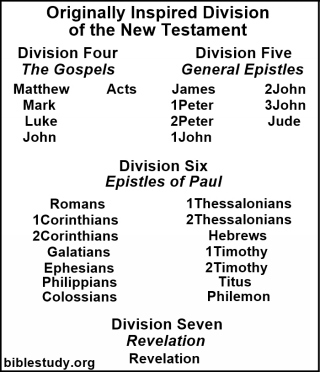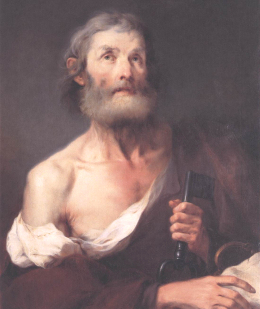This first epistle by Peter is tied with four other books for the fifth shortest in Scripture in terms of chapters. It is the 19th shortest in terms of total verses and the 22nd shortest in terms of words.
[Life of Apostle Peter Timeline]
In its original manuscript order, the fifth division of the Bible is composed of seven books known as the General Epistles. These books are James, 1 and 2 Peter, 1, 2 and 3 John as well as Jude.
1Peter is tied with 1John and James for the largest, in terms of chapters, of the seven General Epistles. The first epistle by Peter is also tied with 1John for the second largest in terms of verses and the second largest in terms of words.
Date Written
The Apostle Peter wrote 1Peter between 64 and 65 A.D. in the city of Babylon (1Peter 5:13). It is one of the last five New Testament books written.
The Author
The Bible does not reveal when Peter, or indeed almost all New Testament individuals, were born. Wikipedia's article on St. Peter offers an educated guess that he was born around 1 B.C. If this is true, he was roughly 30 years old when Jesus was crucified in 30 A.D. and from 64 to 65 years old when he wrote this epistle.

1Peter Chapter Outline
Chpt. 1: Peter opens his first epistle by saying he is writing to those Christians (mostly Jewish converts) living in the area known as Asia Minor. He then discusses the "lively hope" believers are given by God. This hope is in receiving a perfect eternal inheritance when Jesus returns to the earth (verses 1 to 5).
Peter then reminds us that the faith of a Christian is sometimes tested in various trials and difficulties. The purpose of these tests is to purify and strengthen our faith so that it will be one day be worthy of God's praise (verses 6 to 9).
Peter then teaches that believers ought to dedicate themselves to a holy life that is free from the lusts we had before we were converted. Christians are called to be holy because God, their spiritual Father, is holy. This redemption from our former carnal lives was made possible not by our own efforts but by Jesus' sacrifice which reconciled us to God (verses 11 to 21).
The apostle then makes it plain that a Christian's life is purified not merely by believing the truth but also by obeying it. Faith, as James teaches, is dead by itself. It requires our ongoing and active obedience to God for it to live and grow (verses 22 to 23).
What doth it profit, my brethren, though a man say he hath faith, and have not works? can faith save him? . . . Even so faith, if it hath not works, is dead, being alone (James 2:14, 17).
Chpt. 2: Peter opens the chapter by again encouraging believers to reject sin and pursue the pure spiritual milk of the truth (verses 1 to 3).

God's plan is to use Jesus Christ (and not any man, not even Peter!) as the rock, the cornerstone, on which he will build his spiritual house known as the church. Through Christ believers are considered a royal priesthood whose lives should promote God's glory (verses 5 to 10).
[Where Is the True Church of God?]
Christians are also encouraged to live an honest life which willingly submits to the authorities God allows to govern human beings. Believers are to do good and obey authorities (only if they do not conflict with clear Biblical teachings) so that their enemies can, in the future, repent and glorify the Lord (verses 11 to 17).
[Should Christians Pay Taxes?]
Peter then calls upon those Christians who are slaves to faithfully serve their masters even if they are unjustly treated. This principle also applies to those who are not slaves who work for other people. Believers, for the sake of conscience, should endure unfair, unrighteous treatment and do continue to do good as this is God's will (verses 18 to 21).
Chpt. 3: Chapter three begins with Christian wives encouraged to submit themselves to their husbands even if their mates are not believers. Peter then tackles the issue of women focusing on wearing nice clothes or jewelry as a source of beauty or showing others they are well off. He does not condemn clothes or jewelry per se, but rather that females should strive for true beauty which is a humble and meek attitude. Husbands are called upon to honor their wives as they are co-heirs with them of eternal life (verses 1 to 7).
[How Should a Wife Be Submissive?]
[Best Bible Verses About Marriage]
All Christians are called upon to not repay evil with evil but rather do good to all humans. Even if the good that is performed brings unjust trials, believers can be assured that God will work it out for their benefit. Their righteous example will someday cause those who did them wrong to be ashamed (verses 8 to 17).
[Meaning of an Eye for an Eye]
Peter then mentions that Jesus, proving his existence in the Godhead before his human birth, at one time preached to disobedient spirits. He preached to such spirits during the same 120 years Noah preached repentance to humans before the flood (Genesis 6:3, 7:6, 2Peter 2:5) (verses 18 to 20).
The chapter closes by Peter asserting that Jesus, because of his sacrifice, sits at God's right hand. This highly exalted position is due to the Father putting all creation, including humans and all spirits, under his authority (verse 22).
[Who Sits at God's Left Hand?]
Chpt. 4: Peter returns to the theme that Christians should abandon all the carnal practices they pursued before they were converted. This time he admits that such a radical change in our behavior will likely surprise our acquaintances, old friends and family. This surprise is especially shocking to people we know who still indulge in sinful acts.
Those astonished at our new behavior may even be openly hostile to us and accuse us falsely of vanity, hypocrisy or other sins. Peter reminds us, however, that such people will someday have to give an account to God for their treatment (verses 1 to 5).
Peter continues by encouraging believers to zealously serve with whatever gifts and talents God has given them (verses 10 to 11).
[What Are the Gifts of God's Spirit?]
The apostle then warns his readers not to be surprised at the fiery trials that will come their way. Peter, instead, declares that the testing they go through will translate into rejoicing when Jesus' glory is manifested in the End Time (verses 12 to 16).
The chapter closes with Peter admitting that the righteous are saved with great difficulty. Those who suffer according to God's will should continue to do as much good as they can (verses 17 to 19).
Chpt. 5: The last chapter of Peter's epistle charges older men to spiritually feed other church members with humility and a willingness to serve. Those who exercise such responsibilities, however, are NOT to do so with a heavy hand or to exercise hierarchical control over Christians who are God's flock and not theirs (verses 1 to 4)!
[Why Did God
Hate the Nicolaitans?]
Peter then begins to close the chapter by warning Christians to be vigilant and to not let their guard down when it comes to Satan the devil. This is because God's adversary, he reveals, walks around like a hungry lion looking for ways to destroy believers (verses 8 to 9)!
[Will the Devil Live Forever?]
Peter closes his epistle with a promise that God, after we have led a life of overcoming, will perfect, settle and establish us. He sends his readers greetings from Silvanus (likely Silas) and the gospel writer Mark who are with him in the city of Babylon (verses 12 to 14).